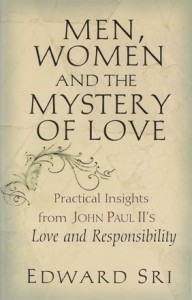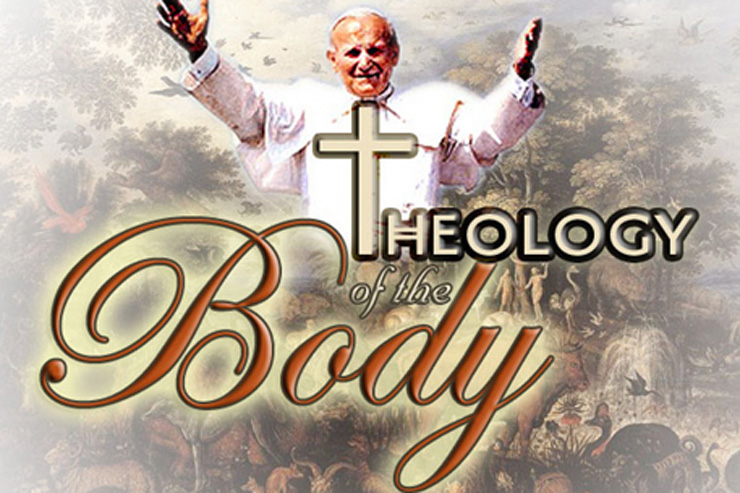Editor’s Note: This is the fourth in a series of articles written by Dr. Edward Sri on Saint John Paul II’s Love and Responsibility. The series is reprinted here with permission and originally appeared in the July/August 2005 issue of Lay Witness magazine. © 2005 Catholics United for the Faith / www.cuf.org/Laywitness/index.asp
Sense and Sensibility: How Could Mr. Right Turn Out to be So Wrong?
Many young people have had the experience of feeling that they were in love with someone who at first seemed absolutely wonderful, only later to be greatly disappointed in the person, disillusioned about the relationship, and perhaps even down on the opposite sex as a whole.
In his book Love and Responsibility, Saint John Paul II — then Karol Wojtyla — explains why this often happens to men and women and how we can avoid such disillusionment in the future.
More Than Physical
In the last issue, we considered one powerful aspect of the attraction between men and women: sensuality. And we saw how this physical attraction is often characterized by a longing to enjoy the body of another person as an object of pleasure.
There is a second kind of attraction, however, that goes beyond physical desire for the body. Wojtyla calls it “sentimentality.” This represents more of an emotional attraction between the sexes.
For example, when boy meets girl, in addition to noticing her “good looks,” he also may find himself powerfully drawn to her femininity, her warm personality, her kindness — or as Wojtyla calls it, her feminine “charm.” Similarly, when girl meets boy, she not only may recognize that he is handsome, but also may find herself having strong feelings and admiration for his masculinity, his virtue, the way he carries himself — or as Wojtyla calls it, his masculine “strength.”
Such emotional reactions toward persons of the opposite sex happen all the time. They can develop gradually between a man and a woman, or they can happen in the first instant they meet each other. We may experience sentimental affection for a spouse, a coworker, or long-time friend. Or we may experience it toward a person we’re introduced to at a meeting, a stranger we see at the mall, or even a fictional character we watch on TV.
Sentimentality can become part of what leads to authentic love. But if we are not careful, we can easily become enslaved to our emotions in ways that prevent us from truly being able to love other persons.
A Sinking Ship
Love should integrate our emotions. In its fullest form, love is not meant to be a cold, calculated decision, devoid of feelings. A spouse saying, “Honey, I love you. I have no feelings at all for you, but know that I am committed to you,” is not the ideal situation. Our emotions are meant to be caught up into our commitment to our beloved, thus enriching the relationship and giving us an even deeper experience of union with the other person (cf., p. 75). As Wojtyla explains, “Sentimental love keeps two people close together, binds them — even if they are physically far apart — to move in each other’s orbit. . . . A person in this state of mind remains mentally always close to the person with whom he or she has ties of affection” (p. 110).
However, Wojtyla is concerned that people today often think of love only in terms of feelings. His concerns seem all the more applicable for a culture like ours, in which love songs, romance films, and TV shows constantly play with our emotions and get us to long for quick, emotionally thrilling relationships like the ones Tom Hanks and Meg Ryan seem to find in the movies.
Real love, however, is very different from “Hollywood love.” Real love requires much effort. It is a virtue that involves sacrifice, responsibility, and a total commitment to the other person. “Hollywood love” is an emotion. It’s something that just happens to you. The focus is not on a commitment to another person, but on what is happening inside you—the powerful good feelings you experience when you’re with this other person.
The Titanic phenomenon of the late 1990s demonstrates how many people have bought into the illusion of “Hollywood love.” Millions of young Americans returned again and again to experience the intensely emotional romance between the two main characters in this film — a romance that is developed between two people who really don’t know each other and have no true commitment to each other, yet is deeply felt by viewers to be the ideal kind of love that would have lasted a lifetime. With this kind of a model to imitate, it’s no wonder so many of our real-life relationships are ending in a shipwreck.
Of course, our feelings can and should be incorporated into a more fully developed love (a theme we will explore in subsequent articles). However, when we are carried away by our emotions, we end up avoiding a very important question that is crucial for the long-term stability of a relationship: the question of truth. We must first and foremost consider the truth about the other person and the truth about the quality of our relationship with him or her.
Avoiding the Question of Truth
One danger of making feelings a measure for our love is that our feelings can be very misleading. In fact, Wojtyla says feelings themselves are “blind,” for they are not concerned with knowing the truth about the other person. Thus, our feelings alone do not make a good compass for guiding our relationships.
He explains that we discover truth through using our reason. I know 2+2=4 not because I feel it equals 4. I come to certainty about this truth through my reason. Our feelings, on the other hand, do not have the job of seeking truth, Wojtyla says.
Therefore, our feelings will not be as helpful of a guide for seeing the honest truth about another person and the truth about a relationship. “Feelings arise spontaneously — the attraction which one person feels towards another often begins suddenly and unexpectedly — but this reaction is in effect ‘blind’” (p. 77).
This becomes especially clear when we consider what happened to our emotions after the fall. Before sin entered the world, man’s intellect easily directed his will to choose what is good and to guide his emotions so that his passions would be directed toward that good.
After the fall, however, the intellect does not see the truth clearly, the will is weakened in its resolve to pursue what is good, and our emotions are no longer properly ordered and are left going in many different directions. Hence, we now experience much instability in the emotional sphere and many chaotic ups and downs (love-hate, hope-fear, joy-sadness, etc.) throughout our lives. Yet, quite ironically, the modern view of love tells us to turn precisely to our “feelings” — to look right in the middle of this emotional roller coaster ride — to find an infallible measure of our love. No wonder there is so much confusion and instability in relationships today!
Is It Really So?
Furthermore, not only do feelings not have the task of seeking truth, but feelings also can be so powerful that they cloud the way we think about a person. Wojtyla explains that when we are carried away by our emotions, sentimentality may hinder our ability to know that person as he or she really is.
This is why Wojtyla stresses that in any emotional attraction, the question of truth about the person is crucial: “Is it really so?” We should be asking ourselves, “Does he or she really have these qualities and virtues I’m so attracted to?” “Are we really as good of a fit for one another as I feel we are?” “Is he or she truly worthy of all my trust?” “Is there a problem in our relationship that I’m overlooking?”
Our feelings do not address these important questions. In fact, our feelings often get us to avoid these questions, leaving us with a distorted and exaggerated perception of the person.
“This is why in any attraction . . . the question of the truth about the person towards whom it is felt is so important. We must reckon with the tendency, produced by the whole dynamic of emotional life, for the [person] to divert the question ‘is it really so?’ In these circumstances the [person] does not enquire whether the other person really possess the values visible to partial eyes, but mainly whether the newborn feeling for that person is a true emotion” (p. 78).
This, again, does not mean that feelings are bad. But they cannot be the primary criterion for discerning the honest truth about another person or for clearly evaluating a relationship.
Out of Proportion
This tendency to be swept away by our emotions and to avoid questions of truth is characteristic of sentimental love. We tend to exaggerate the value of the person we have feelings for, downplay their faults, and ignore any problems we have in the relationship.
Here, Wojtyla makes an amazing statement about how much our feelings can control our perception of the person to whom we’re so attracted. “In the eyes of a person sentimentally committed to another person, the value of the beloved . . . grows enormously — as a rule out of all proportion to his or her real value.”
Did you catch that? Wojtyla doesn’t say that in the beginning stages of sentimental love we might sometimes exaggerate the value of the person. He says this happens as a rule — we do it all the time! And he didn’t say that we tend to exaggerate the person’s value only slightly. We tend to idealize the value of the person “out of all proportion” to whom he or she is in reality!
Therefore, we must enter relationships with our eyes wide open. If we naively say we’re not idealizing the other person at all, it’s probably a sign of how far we have already drifted from reality. In these beginning stages of love, if we are so quick to notice our favorite three or four qualities in our beloved, we should be just as quick to admit that we are likely falling into the tendency to exaggerate these qualities. As Wojtyla explains, “A variety of values are bestowed upon the [beloved] which he or she does not necessarily possess in reality. These are ideal values; not real ones” (p. 112).
Why do we tend to idealize those we’re attracted to? These “ideal values” are the ones that we long, with all our heart, to find in another person someday. They exist in our deepest wishes, desires, and dreams. When we finally meet someone with whom there is the slightest bit of chemistry, our emotions tend to rapidly call up these ideal values and project them onto that person.
Using People Emotionally
When we speak of a man using a woman, we tend to think of this in terms of him using her for sexual pleasure. However, Wojtyla highlights that men and women can use each other for emotional pleasure as well. A devoutly Christian man and woman can have a completely chaste dating relationship, but still be using each other for the “good feelings” they experience when together, for the emotional security of having a boyfriend/girlfriend, or for the pleasure they derive from imagining their wedding day with this other person and hoping the other will finally be “the one.”
If I fall into such sentimental idealization, my beloved is not truly the recipient of my affections. Rather, the other person is more of an opportunity for me to enjoy these powerful emotional reactions stirring within my heart. In this case, I do not truly love the person for her own sake, but I end up using her for the emotional pleasure I derive from being with her. As Wojtyla explains, the beloved who is idealized “becomes merely the occasion for an eruption in the [person’s] emotional consciousness of the values which he or she longs with all his heart to find in another person” (p. 112).
Disillusionment
Perhaps the most tragic effect of sentimental idealization is that we end up not even really knowing the person we’re so attracted to. For example, a man in sentimental love may seek to be close to his beloved, spend a lot of time with her, talk with her, and even go to Mass with her and pray with her. However, if he has idealized her, in reality, he remains quite distant from her — for the powerful affection he feels for her does not depend on her true value, but only on the “ideal values” that he has projected onto her.
Inevitably, this unchecked sentimentality will end in great disillusionment. For when the real person cannot live up to the ideal, the strong feelings will begin to wane, and there will not be much left for the relationship to stand on. The lover will be quite disappointed in their beloved (p. 113). Hence, even though the couple may give every outward appearance of being emotionally close to each other, they remain in fact quite divided from each other (p. 114). They may not really know each other personally, and they may even be using each other for the emotional pleasure they derive from such idealization.
Acknowledgement
(This is the fourth in a series on Saint John Paul II’s Love and Responsibility)
 If you enjoyed this article from Edward Sri’s series on Saint John Paul II’s, Love and Responsibility, and want to learn more about theology of the body, see his book, Men, Women and the Mystery of Love: Practical Insights on John Paul II’s Love and Responsibility (Servant Books).
If you enjoyed this article from Edward Sri’s series on Saint John Paul II’s, Love and Responsibility, and want to learn more about theology of the body, see his book, Men, Women and the Mystery of Love: Practical Insights on John Paul II’s Love and Responsibility (Servant Books).
All references in this column to Saint John Paul II’s Love and Responsibility are taken from the 1993 edition, published by Ignatius Press.
Reprinted with permission from the July/August 2005 issue of Lay Witness magazine. © 2005 Catholics United for the Faith / www.cuf.org/Laywitness/index.asp













